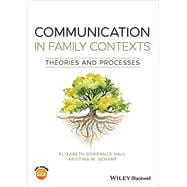An innovative, student-friendly textbook covering the major elements of the field of Family Communication
Family Communication, a rapidly growing sub-discipline within Communication Studies, explores the processes and factors involved in family interactions and relationships. Communication in Family Contexts is a clear and accessible survey of the essential principles, theories, and concepts of the field. Unlike textbooks that present a vast amount of material across only a few chapters—this innovative textbook features brief, easily-understood chapters ideally-suited for undergraduate courses on the subject.
The text provides concise yet comprehensive coverage of a diverse range of topics, from fundamental aspects of caretaking and sibling communication, to topics not covered in other textbooks such as estrangement and marginalization. 33 chapters cover theories of family communication, family communication processes, and communicating in family relationships. The authors, noted researchers and educators in the field, complement discussions of standard topics with those of growing contemporary interest, such as LGBTQ family communication, step-family and half-sibling relationships, and the influence of technology on family. This textbook:
- Provides a well-rounded examination of the major elements of Family Communication studies
- Explains the foundational theories of the field, including Family Communication Patterns Theory and Relational Dialectics Theory
- Features numerous practical application exercises to enable students apply theory to practice
- Includes a complete set pedagogical features, such as case studies, visualizations and models of theories, illustrations, and discussion questions
- Offers a flexible organizational structure that allows instructors to pick and choose chapters to meet the needs of their courses
Communication in Family Contexts: Theories and Processes is an important resource for instructors and students in the field of family communication, the wider discipline of Communication Studies, and related areas such as social psychology and sociology.








